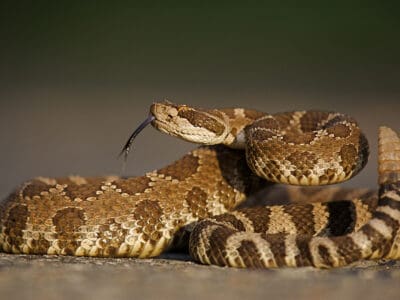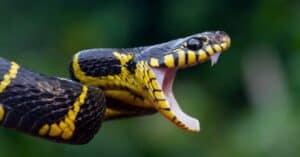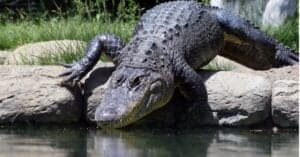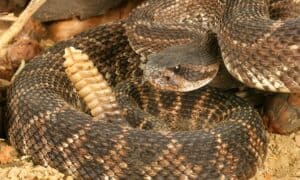Bear vs Shark: Who Would Win in a Fight?
@media (min-width: 481px) {
.mobile-top-content {
display: none;
}
}
#mobileTopContentCTACarouselControls { overflow: hidden; text-overflow: ellipsis; white-space: nowrap; }
.mobile-top-content .more { color: #fff; }
.mobile-top-content a { color: #fff; text-decoration: underline; }
.mobile-top-content a:hover { color: #fff; text-decoration: underline; }
@media (max-width: 480px) {
.mobile-top-content {
background-color: #06a10b;
color: #fff;
text-align: center;
/*height: 60px;
padding-top:5px;*/
font-size:80%;
/* display: block; */
margin: 0px -30px;
}
}
We’ve all heard about unlikely animal kingdom matchups that could actually happen, like when orcas prey on moose. Yet, stranger things could happen in the world today. For example, sharks encounter creatures in the ocean depths as well as those that live near the shoreline. Bears are among those animals that live near the water, and they are known for swimming to travel as well as to hunt their prey. What would happen if a shark met a bear in the water and had a bone to pick? Take a look and see what happens in a bear vs shark battle.
We’ll break down the most important factors that will tell us which creature walks or swims away alive!
Comparing a Bear and a Shark
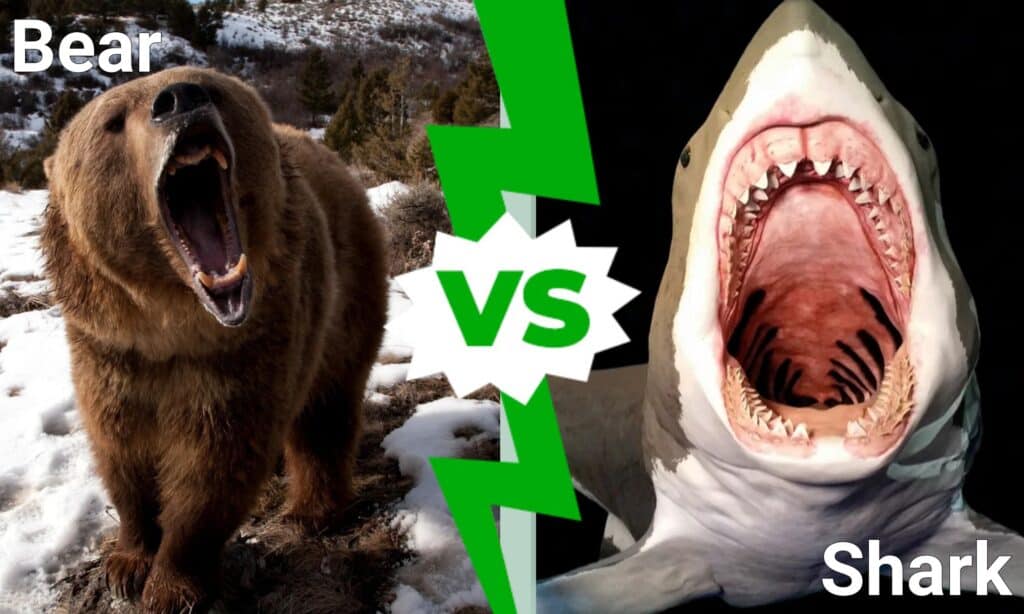
A-Z-Animals.com
| Bear | Shark | |
|---|---|---|
| Size | Weight: 60lbs – 990lbs Height: 2ft – 5ft at shoulder, up to 9 ft standing. Length: 4.5ft – 9.5 ft |
Weight: 200lbs – 2,400lbs Length: 11ft – 21ft |
| Speed and Movement Type | 25-35 mph | – 20mph – 35mph – Uses an undulating, side-to-side motion from the tail and body. |
| Senses | – Some bears can smell from several miles away – Hearing twice as good as humans – Good vision and some bears can see better at dusk. |
– Good vision with sharp focus and night vision. – Great whites hear low frequencies, but it’s not their best sense – Incredible smell for substances at 1 part per 10 billion parts of water – Possess ampullae of Lorenzini to detect electrical fields |
| Defenses | – Large size – Speed to run away – Fierce threat displays – Ability to traverse land and water – Climbing ability |
– Large size – Bursts of speed |
| Offensive Capabilities | – Powerful, bone-breaking bites – Sharp claws that can tear open prey – Uses weight to pin down enemies |
– Massive biting power at 4,000 PSI – About 50 teeth are available to bite in the first row, but 300 teeth overall – Teeth 4-6 inches long – Long, triangular teeth – Fast swim speed |
| Predatory Behavior | – Ambush predator in some cases, waiting for prey to get close before striking – Opportunistic predator that pursues and kills prey in other cases – Typically secures a kill with a single, powerful bite to the throat. |
– Relies on stealth and ambush to attack – Opportunistic predators |
What Are Key Differences Between a Bear and a Shark?
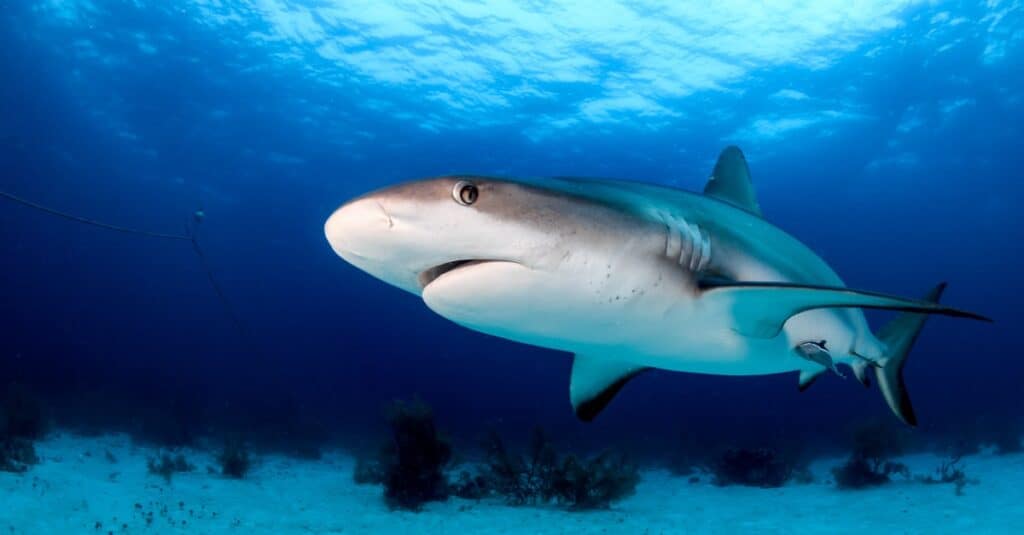
Richard Whitcombe/Shutterstock.com
The biggest differences between a bear and a shark are their morphology and habitat. Bears are terrestrial caniform mammals that possess fur and can weigh up to 990lbs, but sharks are aquatic cartilaginous fish that spend all their time in water and may grow to weigh 2,400lbs.
Sharks are found in every ocean in the world, while bears are found everywhere except in Africa and Australia, including the Arctic Circle.
Knowing these unique qualities, we can start to look closer at other impactful elements of a fight between these two animals.
What Are the Key Factors in a Fight Between a Bear and a Shark?
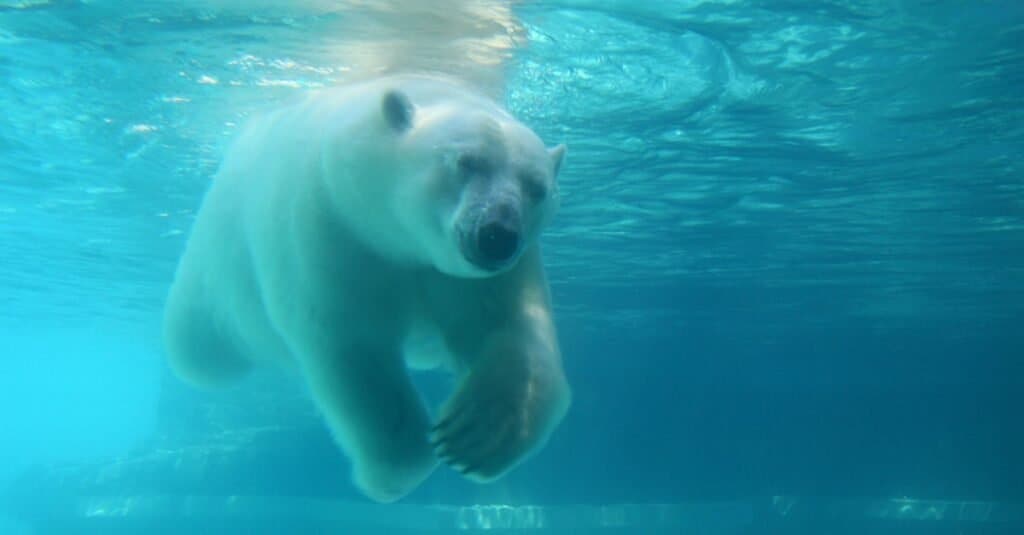
Vladimir Gjorgiev/Shutterstock.com
The most important factors in a battle between a bear and a shark will be their bodies, how they fight, and looking at how they fare in the water where the fight will take place. Some people might believe that bears can’t do well in water, and that’s the case for most of them. However, the polar bear is an accomplished aquatic hunter and swimmer.
Bear vs Shark: Size
The largest sharks are bigger than bears. A shark can weigh up to 2,400lbs and measure 21ft long, but a bear can grow to be about 900lbs, stand 5ft tall at the shoulder, and grow 9.5ft long. Even if you’re looking at the truly extreme ends, the largest great white shark ever recorded weighed 5,000 pounds while the largest polar bear on record weighed 2,209 pounds. The key idea here, the biggest sharks are larger!
Sharks have the size advantage against bears.
Bear vs Shark: Speed and Movement
Sharks are faster than bears in the water. On land, bears can reach speeds of 35 mph, but even the fastest swimmers can only reach about 6 mph in the water. Meanwhile, sharks can cruise at 10 mph with ease and reach 35 mph when they are closing in on their prey to kill it.
Sharks have a speed advantage against bears in the water.
Bear vs Shark: Senses
A bear’s senses are good for hunting. They can smell food and prey from miles away, hear about twice as well as humans, and have good vision in the day and the night.
However, sharks are perfect hunting specimens. Their sense of sight is very good, and their hearing is limited to low frequencies. Yet, they can smell or taste 1 part per 10 billion parts of chemicals in the water and may also sense animals according to their electrical fields.
Sharks have a sensory advantage against bears.
Bear vs Shark: Physical Defenses
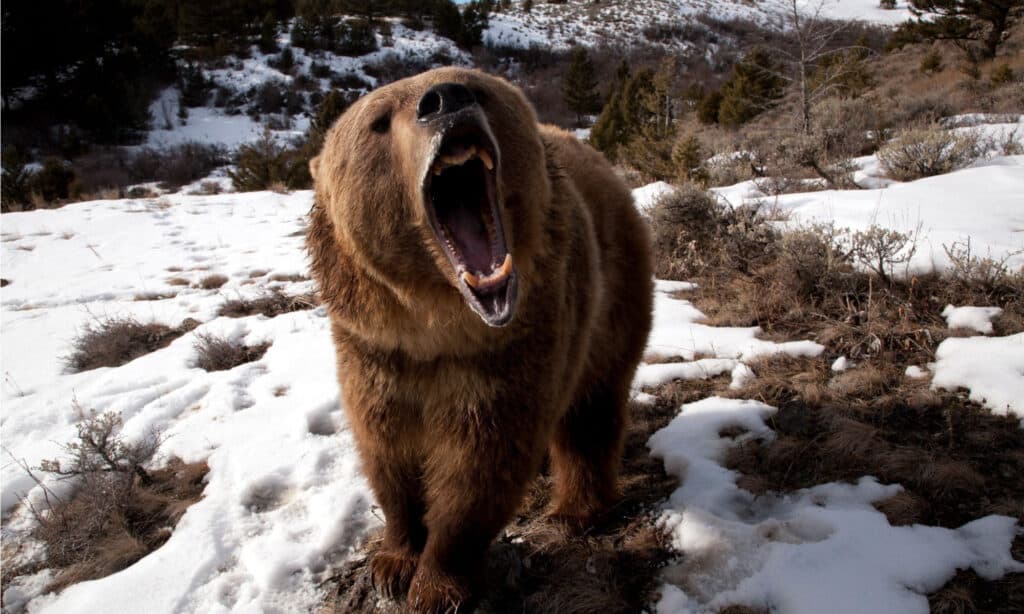
Falade Adewale/Shutterstock.com
Sharks have large bodies, tough skin, speed to leave their enemies behind them, and the knowledge that they are the deadliest thing in the water to keep them safe.
Bears have their large size and speed to keep them safe on land along with the ability to climb trees to get out of trouble. Their threat display is also quite effective in getting other animals, including humans, to leave them alone. Unfortunately, only their size protects them underwater.
Sharks have better defenses than bears.
Bear vs Shark: Combat Skills
Sharks use their senses to locate prey and then ambush them. When they do this, they’ll run into them, land a bite, and then tear away a large chunk of flesh. After a few bites, their prey is helpless and becomes dinner.
Bears will usually maul their prey by charging them down, clawing, and biting them around the neck. Either strangulation or exsanguination spells the end of bears’ victims, and then they start the feast.
Both animals are incredibly good at what they do, capable of taking down all sorts of large prey.
Who Would Win in a Fight Between a Bear and a Shark?
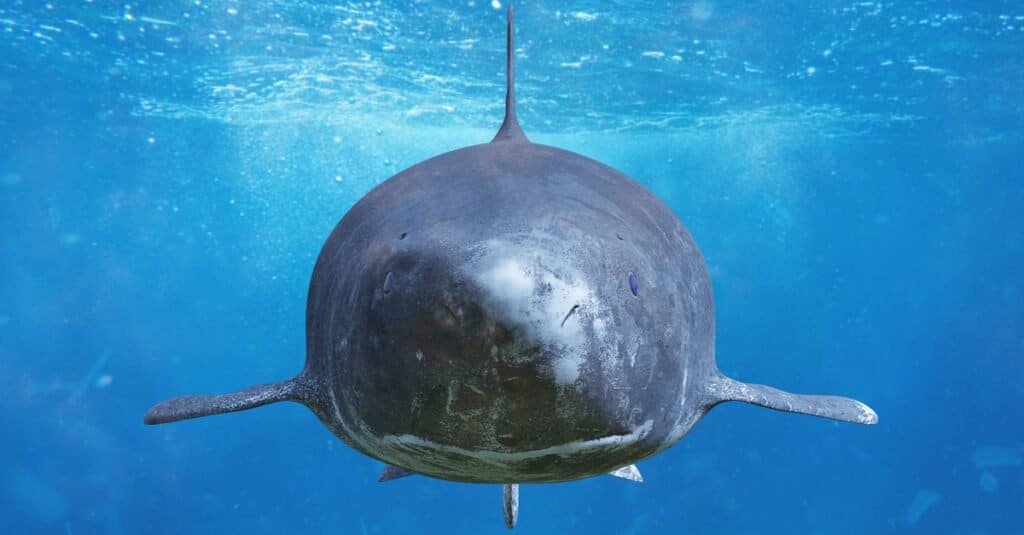
Dotted Yeti/Shutterstock.com
A shark would win a fight against a bear. Although a polar bear might be the best match out of any bear for a shark, it would still lose. It doesn’t have the toolkit needed to slay a creature so much larger, faster, and deadlier than it.
The shark would probably attack from behind or beneath the polar bear, tearing open the bear’s blubbery middle. A few bites are all it takes for the panic to set in, and the polar bear would begin clawing and slashing at the shark. These attacks don’t help, though. The shark will bite over and over again, eventually tearing away so much flesh that the bear is unable to fight back or simply dies.
Very few animals exist that can kill a large shark, and a bear is certainly not one of them. These furry animals cannot inflict a fatal wound on a shark faster than a shark can do the same.
More from A-Z Animals
.more-snake-card-image { max-height:140px !important; }
@media (min-width: 481px) {
.mobile-top-content {
display: none;
}
}
#mobileTopContentCTACarouselControls { overflow: hidden; text-overflow: ellipsis; white-space: nowrap; }
.mobile-top-content .more { color: #fff; }
.mobile-top-content a { color: #fff; text-decoration: underline; }
.mobile-top-content a:hover { color: #fff; text-decoration: underline; }
@media (max-width: 480px) {
.mobile-top-content {
background-color: #06a10b;
color: #fff;
text-align: center;
/*height: 60px;
padding-top:5px;*/
font-size:80%;
/* display: block; */
margin: 0px -30px;
}
}
We’ve all heard about unlikely animal kingdom matchups that could actually happen, like when orcas prey on moose. Yet, stranger things could happen in the world today. For example, sharks encounter creatures in the ocean depths as well as those that live near the shoreline. Bears are among those animals that live near the water, and they are known for swimming to travel as well as to hunt their prey. What would happen if a shark met a bear in the water and had a bone to pick? Take a look and see what happens in a bear vs shark battle.
We’ll break down the most important factors that will tell us which creature walks or swims away alive!
Comparing a Bear and a Shark

A-Z-Animals.com
| Bear | Shark | |
|---|---|---|
| Size | Weight: 60lbs – 990lbs Height: 2ft – 5ft at shoulder, up to 9 ft standing. Length: 4.5ft – 9.5 ft |
Weight: 200lbs – 2,400lbs Length: 11ft – 21ft |
| Speed and Movement Type | 25-35 mph | – 20mph – 35mph – Uses an undulating, side-to-side motion from the tail and body. |
| Senses | – Some bears can smell from several miles away – Hearing twice as good as humans – Good vision and some bears can see better at dusk. |
– Good vision with sharp focus and night vision. – Great whites hear low frequencies, but it’s not their best sense – Incredible smell for substances at 1 part per 10 billion parts of water – Possess ampullae of Lorenzini to detect electrical fields |
| Defenses | – Large size – Speed to run away – Fierce threat displays – Ability to traverse land and water – Climbing ability |
– Large size – Bursts of speed |
| Offensive Capabilities | – Powerful, bone-breaking bites – Sharp claws that can tear open prey – Uses weight to pin down enemies |
– Massive biting power at 4,000 PSI – About 50 teeth are available to bite in the first row, but 300 teeth overall – Teeth 4-6 inches long – Long, triangular teeth – Fast swim speed |
| Predatory Behavior | – Ambush predator in some cases, waiting for prey to get close before striking – Opportunistic predator that pursues and kills prey in other cases – Typically secures a kill with a single, powerful bite to the throat. |
– Relies on stealth and ambush to attack – Opportunistic predators |
What Are Key Differences Between a Bear and a Shark?

Richard Whitcombe/Shutterstock.com
The biggest differences between a bear and a shark are their morphology and habitat. Bears are terrestrial caniform mammals that possess fur and can weigh up to 990lbs, but sharks are aquatic cartilaginous fish that spend all their time in water and may grow to weigh 2,400lbs.
Sharks are found in every ocean in the world, while bears are found everywhere except in Africa and Australia, including the Arctic Circle.
Knowing these unique qualities, we can start to look closer at other impactful elements of a fight between these two animals.
What Are the Key Factors in a Fight Between a Bear and a Shark?

Vladimir Gjorgiev/Shutterstock.com
The most important factors in a battle between a bear and a shark will be their bodies, how they fight, and looking at how they fare in the water where the fight will take place. Some people might believe that bears can’t do well in water, and that’s the case for most of them. However, the polar bear is an accomplished aquatic hunter and swimmer.
Bear vs Shark: Size
The largest sharks are bigger than bears. A shark can weigh up to 2,400lbs and measure 21ft long, but a bear can grow to be about 900lbs, stand 5ft tall at the shoulder, and grow 9.5ft long. Even if you’re looking at the truly extreme ends, the largest great white shark ever recorded weighed 5,000 pounds while the largest polar bear on record weighed 2,209 pounds. The key idea here, the biggest sharks are larger!
Sharks have the size advantage against bears.
Bear vs Shark: Speed and Movement
Sharks are faster than bears in the water. On land, bears can reach speeds of 35 mph, but even the fastest swimmers can only reach about 6 mph in the water. Meanwhile, sharks can cruise at 10 mph with ease and reach 35 mph when they are closing in on their prey to kill it.
Sharks have a speed advantage against bears in the water.
Bear vs Shark: Senses
A bear’s senses are good for hunting. They can smell food and prey from miles away, hear about twice as well as humans, and have good vision in the day and the night.
However, sharks are perfect hunting specimens. Their sense of sight is very good, and their hearing is limited to low frequencies. Yet, they can smell or taste 1 part per 10 billion parts of chemicals in the water and may also sense animals according to their electrical fields.
Sharks have a sensory advantage against bears.
Bear vs Shark: Physical Defenses

Falade Adewale/Shutterstock.com
Sharks have large bodies, tough skin, speed to leave their enemies behind them, and the knowledge that they are the deadliest thing in the water to keep them safe.
Bears have their large size and speed to keep them safe on land along with the ability to climb trees to get out of trouble. Their threat display is also quite effective in getting other animals, including humans, to leave them alone. Unfortunately, only their size protects them underwater.
Sharks have better defenses than bears.
Bear vs Shark: Combat Skills
Sharks use their senses to locate prey and then ambush them. When they do this, they’ll run into them, land a bite, and then tear away a large chunk of flesh. After a few bites, their prey is helpless and becomes dinner.
Bears will usually maul their prey by charging them down, clawing, and biting them around the neck. Either strangulation or exsanguination spells the end of bears’ victims, and then they start the feast.
Both animals are incredibly good at what they do, capable of taking down all sorts of large prey.
Who Would Win in a Fight Between a Bear and a Shark?

Dotted Yeti/Shutterstock.com
A shark would win a fight against a bear. Although a polar bear might be the best match out of any bear for a shark, it would still lose. It doesn’t have the toolkit needed to slay a creature so much larger, faster, and deadlier than it.
The shark would probably attack from behind or beneath the polar bear, tearing open the bear’s blubbery middle. A few bites are all it takes for the panic to set in, and the polar bear would begin clawing and slashing at the shark. These attacks don’t help, though. The shark will bite over and over again, eventually tearing away so much flesh that the bear is unable to fight back or simply dies.
Very few animals exist that can kill a large shark, and a bear is certainly not one of them. These furry animals cannot inflict a fatal wound on a shark faster than a shark can do the same.

